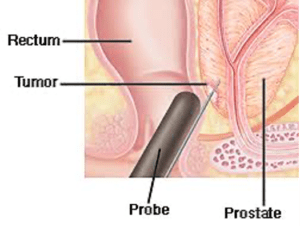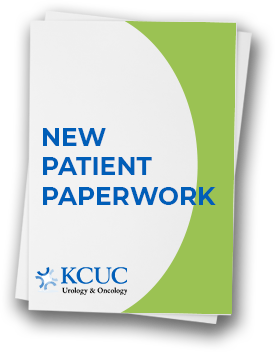What is Prostate Biopsy
Prostate biopsy, also called transrectal ultrasound with biopsy, (TRUS BX) is a commonly done procedure that removes small samples of the prostate, necessary to diagnose prostate cancer. Since the late 1980s, ultrasound rectal probes have been used to visualize the prostate and accurately guide a specialized needle to perform a biopsy. The procedure is done by a urology specialist and is usually recommended because of findings on rectal examination or after serum testing of PSA (prostate specific antigen) that suggest an increased risk of prostate cancer.
How is the procedure done?
This procedure is often done under local anesthesia in the doctor’s office with the patient awake. Alternatively, it may be the preference of the patient or the urologist to do the biopsy under general anesthesia. The patient is placed comfortably on their left side on an examining table (IV sedation may be administered at this time). The rectum is prepared by the nurse who places lidocaine-impregnated jelly into and around the anus. Sometimes a small swab of betadine is inserted into the rectum to cleanse the area. The doctor then gently dilates the anus with a lubricated gloved finger before inserting the transrectal ultra-sonic probe. The prostate is visualized and measured before a needle is inserted through the rectum and lidocaine is injected around the prostate to anesthetize it. A two-part biopsy needle, used through a specialized biopsy instrument, is then directed through the rectum into the area of the prostate to be biopsied. The surgeon will concentrate on any areas of imaging abnormality and then use a template to sample the areas of the prostate in the peripheral zone, where cancer most commonly occurs. Usually a total of 12 biopsies are performed and the procedure takes 5-10 minutes. The biopsy specimens of the prostate are then sent to a pathologist for viewing under the microscope in order to make the diagnosis of cancer, if present.

from uro-docs.com
What are the risks?
- Bleeding – It is common to have some light bleeding in your urine and rectum for a few days. Clot urinary retention or heavy bleeding from the rectum is present in about 1-2 %
- Blood in your semen.Some rust color in your semen may be present and is normal. It can last for up to 6 weeks but is not harmful.
- Difficulty urinating.Some swelling of the prostate can occur after biopsy and make the urinary stream slow. This usually lasts only a few days. More significant obstruction is uncommon.
- Care is taken to prevent infections with a light bowel prep, oral and injectable antibiotics and a rectal swab. Serious infections after biopsy can occur, but are unusual, estimated to be 2-4 %.
- Sexual disfunction- The prostate biopsy should not affect the nerves which are responsible for erections. But blood in the semen, prostate discomfort with ejaculation, psychological aspects of prostate cancer evaluation, and other causes may result in some sexual disfunction. It is usually temporary.
How do I prepare for the biopsy?
(instructions are given when the biopsy is scheduled)
- Discontinue any medicines or supplements for 7 days before the procedure that may thin the blood — some examples include, warfarin (Coumadin), aspirin, ibuprofen (Advil, Motrin), omega 3 fish oil, garlic, and some vitamins. You will be given a more complete list.
- Do a cleansing enema at home before your biopsy appointment.
- Take antibiotics 30 to 60 minutes before your prostate biopsy to help prevent infection.
What can I expect after the biopsy and when should I call the doctor’s office?
You will recover for about 20 minutes in the doctor’s office and then be dismissed to home. You should have someone with you to drive. At home it is best to lie down or recline for a few hours to prevent bleeding and reduce swelling. For discomfort, take Tylenol for the first 24 hours then Advil beginning the following day. Sitting in a warm bath can also be helpful. No heavy lifting or straining for 48 hours after the biopsy. There are really no restrictions after 2 days but avoid riding a narrow seat bicycle for a week. You will get a phone call from our office a few days after the procedure to check on you. The biopsy results are generally ready in about 7 days.
Call the doctor’s office for:
- Fever over 100.5 degrees Fahrenheit
- Heavy bleeding with clots
- Difficulty with urination
- Pain, more than just achiness in the prostate area for a few days
- Biopsy results if you have not heard within 7 days

